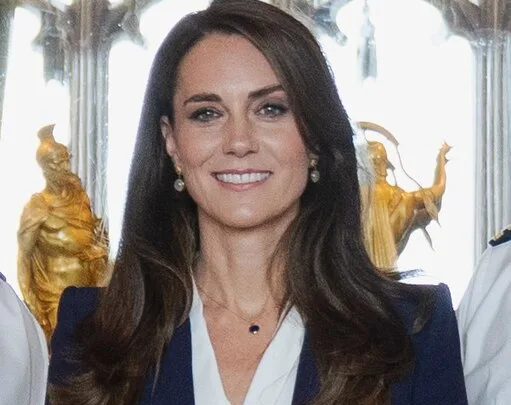As Prince George faces a future filled with unprecedented changes, Princess Kate takes on a crucial role in guiding and supporting her son through his journey to the throne
Prince George, the second in line to the British throne, is poised to face significant challenges as he prepares for his eventual role as King. According to royal commentator Robert Jobson, the societal landscape and the perception of the monarchy may shift dramatically by the time George ascends to the throne. In an era where traditional deference to the Royal Family is expected to decline, George’s reign could be marked by a very different societal context compared to the one his great-grandmother, Queen Elizabeth II, experienced.
During an interview with GB News, Jobson expressed concerns about the potential erosion of royal deference, particularly in former British realms like Australia, New Zealand, and Canada. He speculated that these countries might have distanced themselves from the monarchy by the time George becomes King, leading to a vastly different royal landscape.
Embed from Getty ImagesHowever, amid these potential challenges, Princess Kate, George’s mother, has identified what she believes to be her most important role: supporting and guiding her son as he navigates the complexities of his future position. Jobson highlighted the crucial role Kate will play in helping George adjust to the demands of kingship, drawing parallels with how her own family supported her transition into royal life.
Kate’s strong family ties have been instrumental in her ability to rise to the challenges of royal life. Her family’s love and support, particularly during her university years, provided a stable foundation that helped her thrive in the public eye. This grounding, Jobson suggests, is something Kate is likely to pass on to George, ensuring he remains resilient in the face of royal pressures.
Jobson also emphasized the importance of Kate’s own experiences with real-life challenges, such as her brother James Middleton’s battle with depression, which has given her a deeper understanding of personal adversity. These experiences, coupled with the public scrutiny that both William and Harry have endured throughout their lives, have equipped Kate with valuable insights that she can share with George as he prepares for his future role.
Despite the immense wealth and resources available to the Royal Family, including the substantial income generated by the Duchy of Cornwall, Jobson pointed out that the true challenges for George will not be financial. Instead, they will revolve around the changing societal expectations and the potential evolution of the monarchy in a world that is increasingly questioning traditional institutions.
As George grows up under the watchful eyes of both the public and his family, Kate’s role as a guiding figure will be crucial in helping him navigate these challenges. Her commitment to ensuring that George is well-prepared for the future underscores her dedication to her family and her son’s future as King.
Analysis:
Political:
Prince George’s future reign is likely to be shaped by significant political changes within the Commonwealth and beyond. As countries like Australia, New Zealand, and Canada reconsider their ties to the British monarchy, George may inherit a throne with a diminished global influence. This potential shift could impact the UK’s diplomatic relationships, requiring George to navigate a complex political landscape where the monarchy’s role is more symbolic than ever before. The gradual loss of these realms may also prompt a reevaluation of the monarchy’s relevance in the modern world, challenging George to redefine what it means to be a monarch in the 21st century.
Social:
Socially, the decline in deference to the monarchy reflects broader societal changes, including a growing emphasis on equality and the questioning of traditional hierarchies. As society becomes more egalitarian, the once-unquestioned respect for the Royal Family may wane, leading to a more scrutinized and less revered monarchy. This shift could place additional pressure on George to modernize the institution and make it more relatable to contemporary society. Kate’s influence as a grounded and empathetic mother will be crucial in helping George remain connected to the public and understanding the societal issues that resonate with his future subjects.
Racial:
The British monarchy has faced increasing scrutiny over its historical ties to colonialism and its role in upholding systemic racial inequalities. As the world becomes more aware of these issues, Prince George may face calls for the monarchy to address its past and take a more active stance on promoting racial equality. This could involve acknowledging historical wrongs, supporting initiatives that address racial disparities, and ensuring that the monarchy reflects the diversity of the modern UK. Kate’s role in guiding George through these challenges will be essential, particularly in helping him understand the importance of inclusivity and representation.
Gender:
Gender roles within the Royal Family have evolved over the years, with female members like Queen Elizabeth II and Princess Diana leaving significant legacies. As George ascends to the throne, he may face expectations to continue this legacy of strong female leadership within the monarchy. Kate, as a modern and influential figure, will likely play a key role in shaping George’s understanding of gender equality and the importance of supporting women’s rights. Her example as a strong, independent woman will serve as a model for George as he navigates the expectations of his future reign.
Economic:
Economically, the monarchy’s wealth and financial resources have long been a point of contention, particularly in times of economic hardship for the general population. As King, George may face increasing demands for transparency and accountability regarding the Royal Family’s finances. The substantial income generated by the Duchy of Cornwall, which currently benefits Prince William, could become a focal point for debates about the monarchy’s financial privileges. Kate’s role in helping George understand the importance of responsible stewardship of these resources will be vital in ensuring that the monarchy remains relevant and respected in an economically challenging world.
